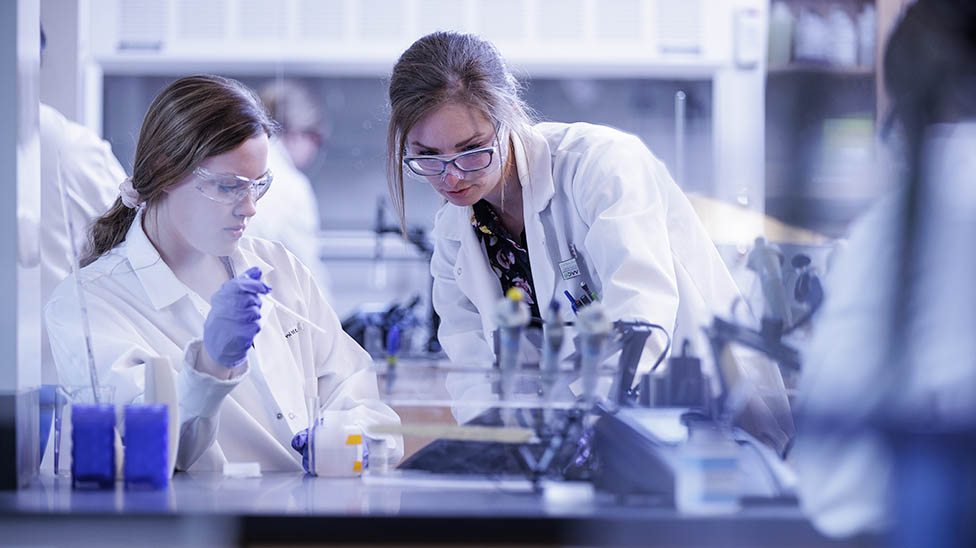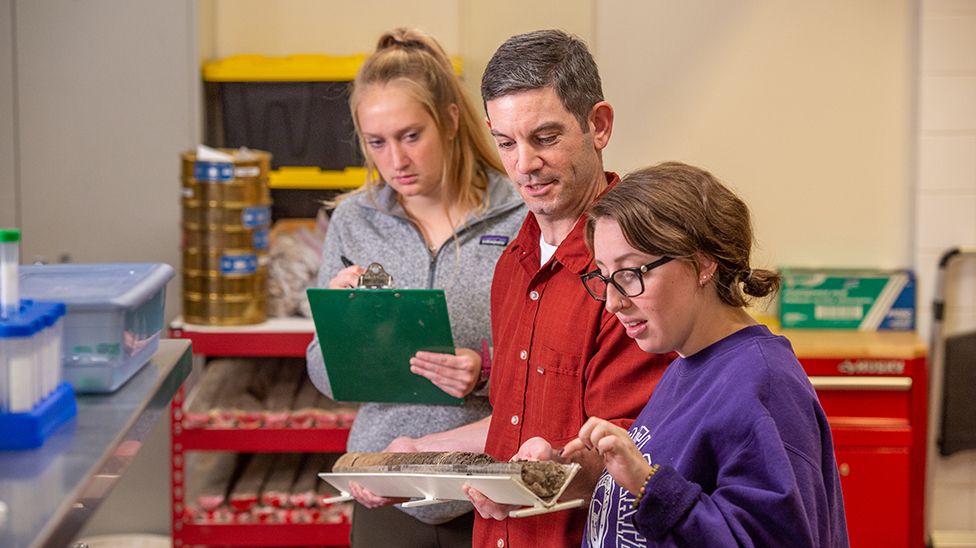
Science
Choosing a science program empowers you with critical thinking and problem-solving skills, paving the way for a diverse range of careers where innovation and research thrive. Whether you're passionate about making a lasting impact in fields like environmental science, agricultural science, geology, or science education, you'll gain the tools needed to adapt and excel in the evolving job market.
Careers in Science
As a professional in the science arena, you will find a variety of ways to positively impact the world around you. Working hands-on in the field, conducting research and serving students in the classroom are just a few examples of this dynamic job pathway.
- Soil Scientist
- Conservation Scientist
- Water Quality Scientist
- Food Scientist and Technologist
- Field Seismologist
- Farming
- Geologist
- Science Education
Potential Salary
Median Salary $78,280
Science Degrees at MSU
Agronomy, Bachelor of Applied Science
Gain hands-on expertise in crop and soil sciences, precision agriculture, and sustainable farm management. Master plant science, weed control, seed technology, and soil conservation while learning the business of farming—from planning to marketing. With a focus on real-world applications, our program prepares you for a thriving career in modern agriculture. Ready to cultivate success?
Environmental Science, Bachelor of Science
The Environmental Science program is an interdisciplinary area of study directed towards understanding natural environmental processes, human interactions with the environment, and ultimately finding equitable and sustainable solutions to environmental problems.
Geology, Bachelor of Science
The Bachelor of Science in Geology prepares students for careers in the Geoscience and Environmental Science job sectors. Geoscientists study Earth’s rocks, minerals, soil, and water, and work in environments that range from the outdoors to laboratories and offices. Occupations include environmental scientist, hydrogeologist, geophysicist, paleontologist, and more. Geology careers require a bachelor’s degree, with some specializations requiring graduate study. This degree also prepares graduates for Professional Geologist licensure, which offers additional opportunities for advancement in Geology careers.
- Effective starting fall 2025: This program is closed for admissions. This program will merge into the Environmental Science BS. Please contact the Biology Dept with any questions.
Geology, Minor
The Geology minor is an introduction to the field and is the perfect complement to an anthropology, biology, chemistry, geography, or physics degree.
Life Science Teaching 5-12, Bachelor of Science
The Bachelor of Science in Life Science Teaching allows students to utilize their passion for the natural world in the classroom. This program satisfies licensure-to-practice standards for Minnesota and may satisfy standards for other states or US territories. The State of Minnesota grants science teacher licensure for grades 9-12 Life Science.
Chemistry Teaching, Bachelor of Science
The Bachelor of Science in Chemistry Teaching provides students with dynamic classroom and lab experiences while preparing them to translate their learning in a school setting. This program satisfies licensure-to-practice standards for Minnesota and may satisfy standards for other states or US territories. This degree is accredited by the American Society for Biochemistry and Molecular Biology (asbmb.org) and the American Chemical Society (acs.org).
Physics Teaching, Bachelor of Science
The Bachelor of Science in Physics Teaching provides a strong foundational knowledge of physics laws and principles, while pairing with an educational curriculum to prepare students for working in a school setting. This program satisfies licensure-to-practice standards for Minnesota and may satisfy standards for other states or US territories. The Physics Teaching Bachelor of Science prepares students to teach physics in middle and high school settings.
Agronomy, Bachelor of Applied Science
Gain hands-on expertise in crop and soil sciences, precision agriculture, and sustainable farm management. Master plant science, weed control, seed technology, and soil conservation while learning the business of farming—from planning to marketing. With a focus on real-world applications, our program prepares you for a thriving career in modern agriculture. Ready to cultivate success?
Environmental Science, Bachelor of Science
The Environmental Science program is an interdisciplinary area of study directed towards understanding natural environmental processes, human interactions with the environment, and ultimately finding equitable and sustainable solutions to environmental problems.
Geology, Bachelor of Science
The Bachelor of Science in Geology prepares students for careers in the Geoscience and Environmental Science job sectors. Geoscientists study Earth’s rocks, minerals, soil, and water, and work in environments that range from the outdoors to laboratories and offices. Occupations include environmental scientist, hydrogeologist, geophysicist, paleontologist, and more. Geology careers require a bachelor’s degree, with some specializations requiring graduate study. This degree also prepares graduates for Professional Geologist licensure, which offers additional opportunities for advancement in Geology careers.
- Effective starting fall 2025: This program is closed for admissions. This program will merge into the Environmental Science BS. Please contact the Biology Dept with any questions.
Geology, Minor
The Geology minor is an introduction to the field and is the perfect complement to an anthropology, biology, chemistry, geography, or physics degree.
Life Science Teaching 5-12, Bachelor of Science
The Bachelor of Science in Life Science Teaching allows students to utilize their passion for the natural world in the classroom. This program satisfies licensure-to-practice standards for Minnesota and may satisfy standards for other states or US territories. The State of Minnesota grants science teacher licensure for grades 9-12 Life Science.
Chemistry Teaching, Bachelor of Science
The Bachelor of Science in Chemistry Teaching provides students with dynamic classroom and lab experiences while preparing them to translate their learning in a school setting. This program satisfies licensure-to-practice standards for Minnesota and may satisfy standards for other states or US territories. This degree is accredited by the American Society for Biochemistry and Molecular Biology (asbmb.org) and the American Chemical Society (acs.org).
Physics Teaching, Bachelor of Science
The Bachelor of Science in Physics Teaching provides a strong foundational knowledge of physics laws and principles, while pairing with an educational curriculum to prepare students for working in a school setting. This program satisfies licensure-to-practice standards for Minnesota and may satisfy standards for other states or US territories. The Physics Teaching Bachelor of Science prepares students to teach physics in middle and high school settings.
Other Science Programs

Biology
A critical understanding and awareness of cellular and molecular physiology is necessary for future leaders pursuing careers in healthcare, translational or essential scientific discovery.

Chemistry
Chemistry is the study of matter and the properties of their makeup. Our program exposes students to a variety of relevant topics in chemistry, such as inorganic, organic, physical, theoretical, materials, environmental, and industrial branches.

Earth Science
Earth Systems Science is a STEM field that utilizes our understanding of the various interconnected systems on Earth to address major environment problems of our time.
Related Programs

Agribusiness and Food Innovation, Bachelor of Science
The Agribusiness and Food Innovation major shapes future agribusiness leaders by building their knowledge and skills in agriculture and food, with hands-on learning and leadership development in the field. This degree is part of the College of Business, an accredited member of AACSB International-The Association to Advance Collegiate Schools of Business.

Nutrition, Food and Dietetics
In the Dietetics, Food and Nutrition programs, students will gain knowledge needed for careers in health, fitness, dietetics and food-related industries, with opportunities for supervised practice and graduate studies.
Biology Department
College of
Science, Engineering and Technology
Become part of the next generation of leaders, innovators, and researchers as a student at Minnesota State Mankato’s College of Science, Engineering and Technology. Whether you're fascinated by the natural world, modern engineering, or advancements in technology, you belong here.
Learn More About the College of Science, Engineering and Technology
